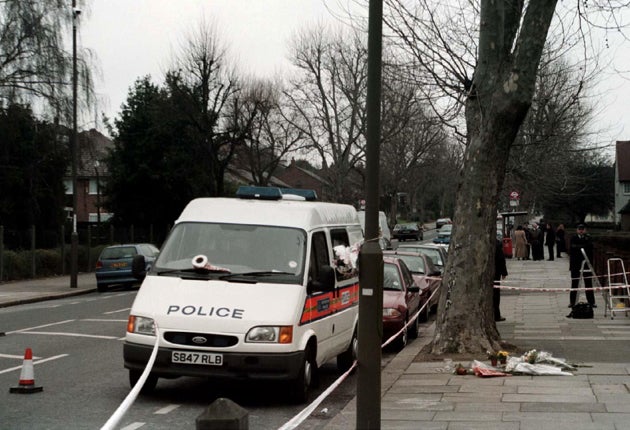Officer on Lawrence case arrested
Constable accused of failing to pass on information about racist killing

A retired police officer and a civilian police worker involved in the botched investigation into the murder of Stephen Lawrence have been arrested for allegedly failing to pass on information related to the killing.
The 62-year-old former police constable and 53-year-old member of police staff were detained on Thursday on suspicion of perverting the course of justice. They are suspected of hiding information about the murder of the black teenager from the Macpherson inquiry, which marked a watershed in British policing when it accused the Metropolitan Police of "pernicious and institutionalised racism".
No one has ever been convicted of the killing of the 18-year-old student, who was set upon by a gang at a bus stop in Eltham, south-east London, on 22 April 1993 and stabbed in the chest and arm. After running more than 100m to try to escape his assailants, Stephen collapsed and bled to death. Five men were arrested after the killing but none has been convicted of the murder.
The Independent Police Complaints Commission said a recent internal review by Scotland Yard into whether there had been any criminal wrongdoing by Metropolitan Police officers involved in the original murder inquiry had uncovered material that allegedly had not been disclosed to either the 1999 Macpherson inquiry or a re-investigation of the murder by Kent Police two years earlier.
Crucially, the police watchdog, whose investigators spent two months assessing the Yard's findings before making the arrests this week, said it was also investigating whether the material was made available to the original murder inquiry.
An IPCC spokesman said: "We are investigating whether this material was considered by the original investigation and why it was allegedly not disclosed to either the Kent inquiry or the Macpherson inquiry.
"The IPCC will consider and report on whether or not any criminal or disciplinary offences may have been committed by any police officer, former police officer or member of police staff involved."
Campaigners and friends of the Lawrence family, who the IPCC said had been kept informed of the developments, welcomed the move, saying there had been longstanding concerns that information given to police in the immediate aftermath of the murder had not been used.
Baroness Howells, patron of the Stephen Lawrence Charitable Trust, said: "Lots of people said they gave the police evidence which was never produced. We knew something was going on. I am delighted with anything that clears up that mess because it was not just one person who committed a murder, it was five or six.
"I do not want to have a 21st anniversary of Stephen's death without justice. It is good news."
Lord Herman Ouseley, the former chairman of the Commission for Racial Equality said: "The important thing about the Stephen Lawrence case is that a lot of people had suspicions about the nature of policing at the time and how people covered for each other."
The nature of the allegedly hidden material was not disclosed. It is understood that it does not relate to the most high-profile of several previous claims that corruption at the heart of the investigation team contributed to the failure to secure the conviction of Stephen's killers, which continues to dog the Metropolitan Police to this day.
Three of the five men arrested for the murder – Gary Dobson and Neil Acourt, both 32, and 31-year-old Luke Knight – were acquitted of murder after a private prosecution brought by the Lawrence family collapsed at the Old Bailey in 1996. The two remaining suspects, David Norris and Jamie Acourt, both 31, the brother of Neil, were never tried. All five denied any involvement in the killing.
Neil Putnam, a Metropolitan Police detective, alleged in a BBC documentary that a senior detective in the first Lawrence murder team, John Davidson, had a corrupt relationship with Clifford Norris, the gangster father of David Norris, and helped to shield the suspects.
Mr Putnam, who was himself convicted of corruption, claimed this information was withheld from the Macpherson inquiry. A subsequent IPCC investigation found there was no basis to the claims and exonerated Mr Davidson. He had denied the claims.
The retired police officer and civilian worker, who has been suspended, were released on bail until 1 March next year.
Police in the dock: Perverting the course of justice?
*The Guildford Four
The supposed IRA bombers were cleared of any involvement in the 1975 attacks after notes were discovered showing that police interviews of one of the men, Patrick Armstrong, had been heavily edited to fit the case against them. Lord Lane found in 1989 that it was possible the evidence in the case had been "completely fabricated" and quashed the convictions. In 1991, the verdicts against the Maguire Seven, the Guildford Four's alleged bomb-makers, were thrown out after a court found that some had been beaten by Metropolitan Police officers and information withheld.
*George Glen Lewis
Mr Lewis spent more than five years in jail after being convicted of armed robbery and burglary. His conviction was quashed in 1992 after it emerged that he had been beaten into a confession by two members of the now disbanded West Midlands Serious Crime Squad. He was awarded £200,000 compensation in 1998. A year later, Kevin Twitchell, who said he was tortured into confessing to manslaughter by members of the same squad, had his conviction quashed.
*Operation Countryman
This six-year investigation into corruption within the Metropolitan Police in the 1970s was sparked by allegations that vice squad officers were being bribed by Soho sex club owners. By the time it closed in 1984, some 400 Met officers had lost their jobs. Despite a recommendation that a further 300 face criminal charges, no officer was ever charged with a criminal offence related to the investigation.
